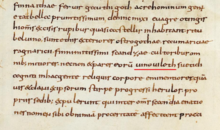
Vinoviloth are one of the tribes in Scandza (Scandinavia) mentioned by Jordanes in De origine actibusque Getarum in the 6th century CE. It has been suggested that they would have been the same as the Winnili. Sometimes Vingulmark is also mentioned. Jordanes writes:
And there are beyond these the Ostrogoths, Raumarici, Aeragnaricii, and the most gentle Finns, milder than all the inhabitants of Scandza. Like them are the Vinovilith [sic] also.
Besides De origine, the Vinoviloth are not mentioned anywhere else.
Alfred Anscombe proposes that the Vinoviloth were Goths settled in Britain at Vinovia. These would be the Goths mentioned by Asser as ancestors of Alfred the Great. The second element of their name would be related to Old English loða, cloak, which Anscombe sees as the second element in the name Lancelot. These names, in his view, have a parallel development because Lancelot can be associated with Binchester (Vinovia).
See also
References
- ^ De origine actibusque Getarum. See also English translation by C. C. Mierow.
- See Christie, Neil. The Lombards: The Ancient Longobards (The Peoples of Europe Series). ISBN 978-0-631-21197-6.
- Alfred Anscombe (1913), "The Name of Sir Lancelot du Lake", The Celtic Review 8(32): 365–366.
- Alfred Anscombe (1913), "Sir Lancelot du Lake and Vinovia", The Celtic Review 9(33): 77–80. "It is with the etymon of Vinovia that I would identify the stem of the prototheme in Vinov-i-loth ... locate the 'Goths and Jutes' at Binchester ."